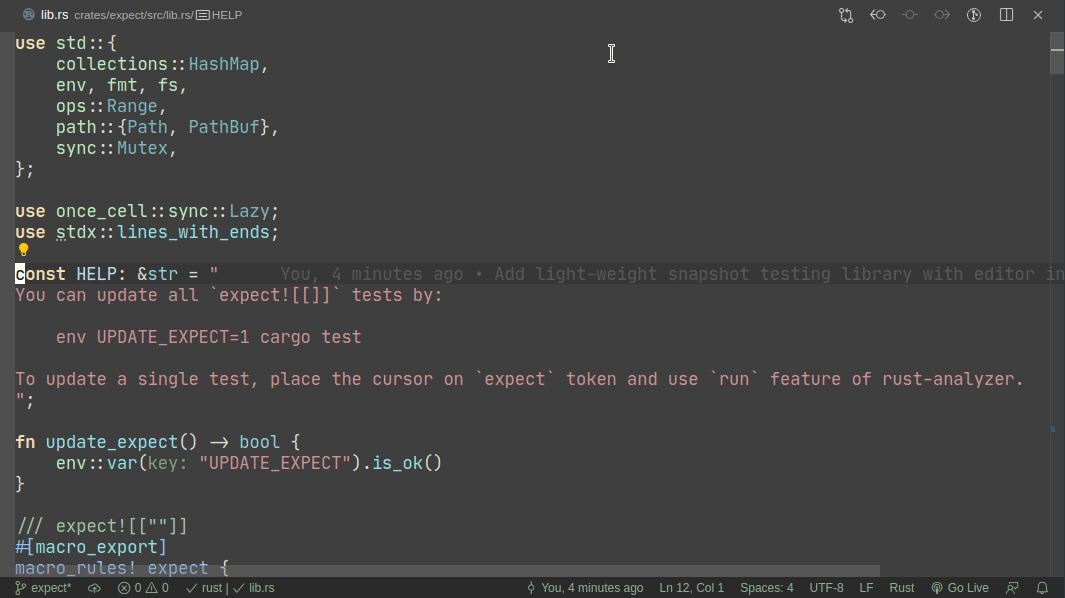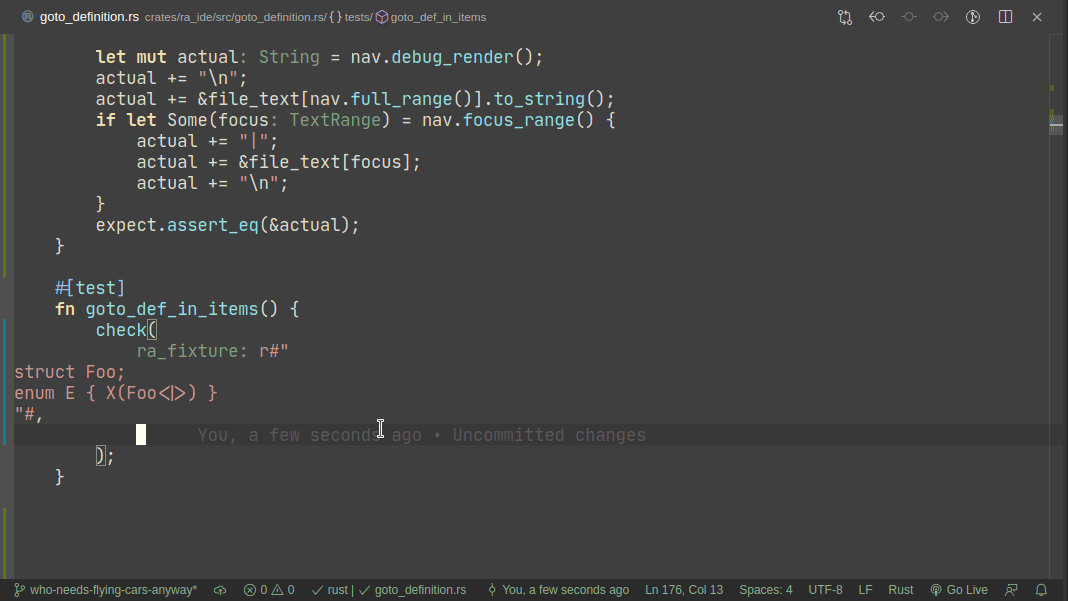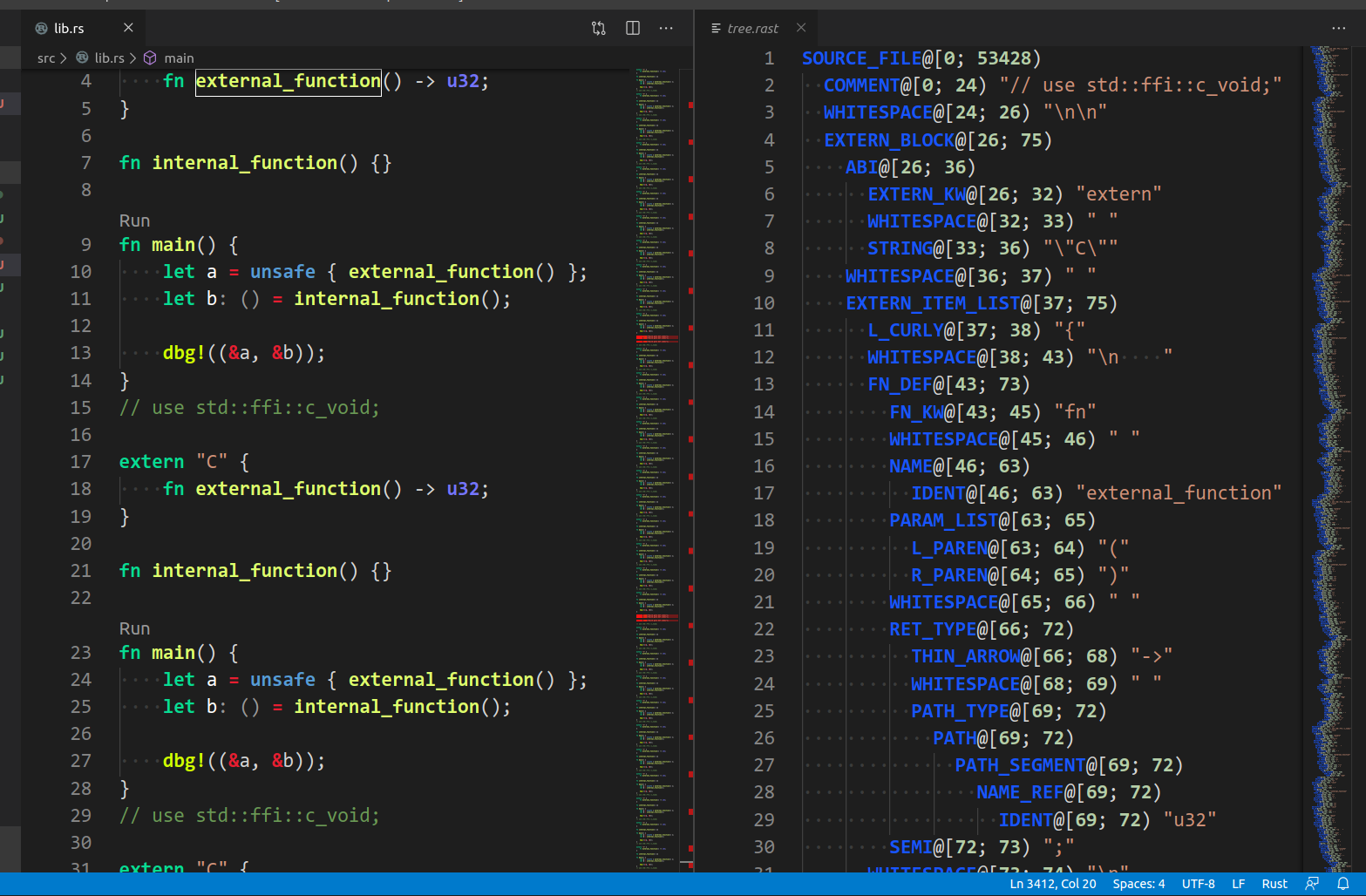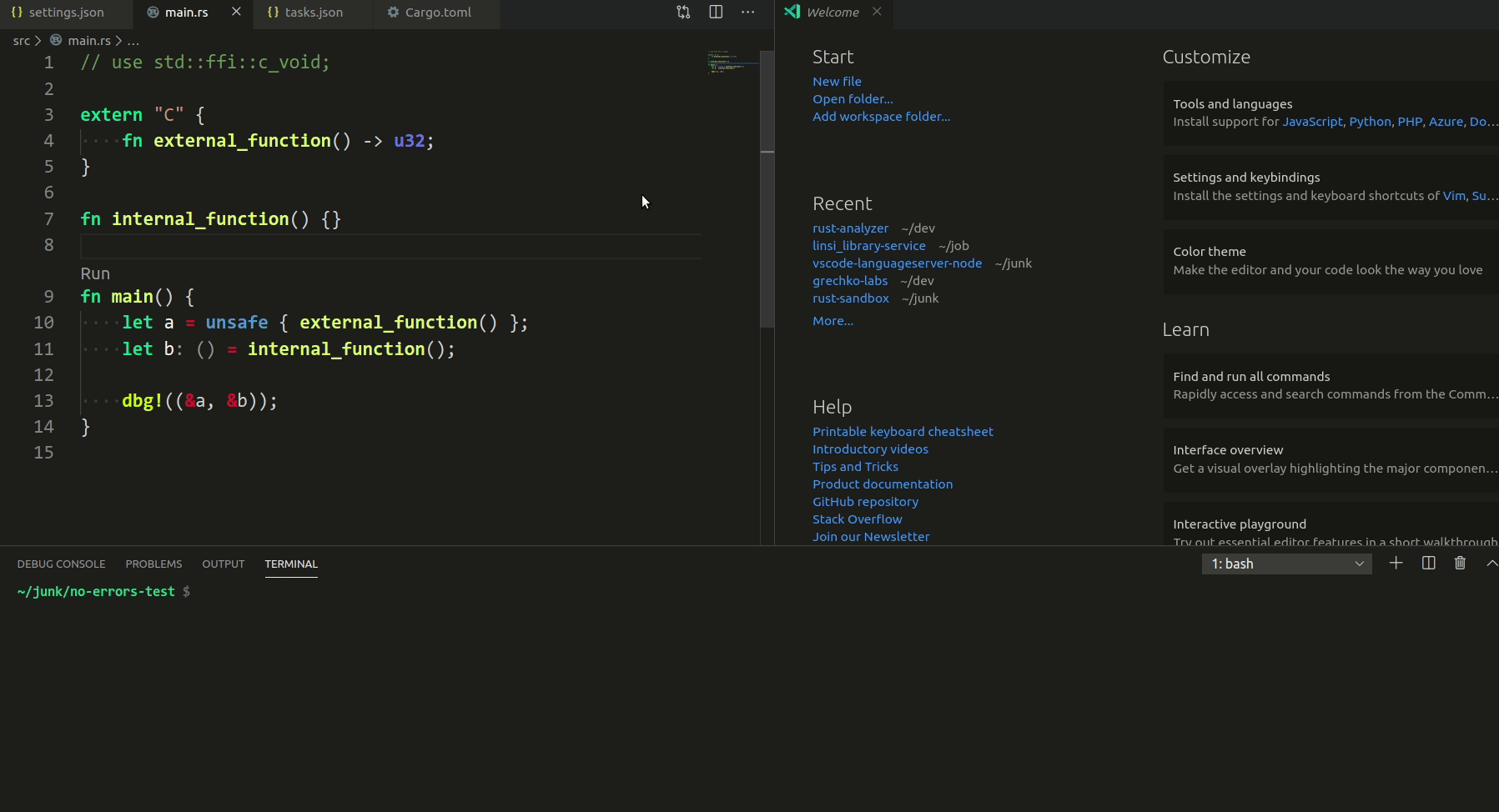No we return ContentModified during the workspace loading. This signifies the language
client to retry the operation (i.e. the client will
continue polling the server while it returns ContentModified).
I believe that there might be cases of overly big projects where the backoff
logic we have setup in `sendRequestWithRetry` (which we use for inlay hints)
might bail too early (currently the largest retry standby time is 10 seconds).
However, I've tried on one of my project with 500+ dependencies and it is still enough.
5513: Try figure out correct workspace in vscode multi root workspace r=vsrs a=urbandove
the code to replace the root with the `${workspaceRoot}` arg breaks in multi root workspaces as it needs a qualifier `${workspaceRoot:workspaceName}`
This PR attempts to figure out the root workspace - and if it cant find it falls back to the first workspace
Co-authored-by: Urban Dove <urbandove80@gmail.com>
5480: Fix snippetTextEdits applying to other files r=matklad a=TimoFreiberg
Fixes#4551
`vscode.window.visibleTextEditors` only contains editors whose contents are being displayed at the moment, so the previous logic only worked if the other file for which a snippetTextEdit is being received was visible in a separate split.
I feel that this is a hacky approach, so feel free to reject it for something nicer :)
Co-authored-by: Timo Freiberg <timo.freiberg@gmail.com>
vscode.window.visibleTextEditors only contains editors whose contents
are being displayed at the moment, so the previous logic only worked if
the other file for which a snippetTextEdit is being received was visible
in a separate split.
Co-authored-by: bjorn3 <bjorn3@users.noreply.github.com>
Override miniz_oxide to build it with optimizations
Building this crate with optimizations decreases the gzipping
part of `cargo xtask dist` from `30-40s` down to `3s`,
the overhead for `rustc` to apply optimizations is miserable on this background
5202: Runnable env r=matklad a=vsrs
This PR adds on option to specify (in the settings.json) environment variables passed to the runnable.
The simplest way for all runnables in a bunch:
```jsonc
"rust-analyzer.runnableEnv": {
"RUN_SLOW_TESTS": "1"
}
```
Or it is possible to specify vars more granularly:
```jsonc
"rust-analyzer.runnableEnv": [
{
// "mask": null, // null mask means that this rule will be applied for all runnables
env: {
"APP_ID": "1",
"APP_DATA": "asdf"
}
},
{
"mask": "test_name",
"env": {
"APP_ID": "2", // overwrites only APP_ID
}
}
]
```
You can use any valid RegExp as a mask. Also note that a full runnable name is something like *run bin_or_example_name*, *test some::mod::test_name* or *test-mod some::mod*, so it is possible to distinguish binaries, single tests, and test modules with this masks: `"^run"`, `"^test "` (the trailing space matters!), and `"^test-mod"` respectively.
Fixes#4450
I suppose this info should be somewhere in the docs, but unsure where is the best place.
Co-authored-by: vsrs <vit@conrlab.com>
5089: Disable auto-complete on comments r=matklad a=BGluth
Resolves#4907 by disabling any auto-completion on comments.
As flodiebold [pointed out](https://github.com/rust-analyzer/rust-analyzer/issues/4907#issuecomment-648439979), in the future we may want to support some form of auto-completion within doc comments, but for now it was suggested to just disable auto-completion on them entirely.
The implementation involves adding a new field `is_comment` to `CompletionContext` and checking if the immediate token we auto-completed on is a comment. I couldn't see a case where we need to check any of the ancestors, but let me know if this is not sufficient. I also wasn't sure if it was necessary to add a new field to this struct, but I decided it's probably the best option if we want to potentially do auto-completion on doc comments in the future.
Finally, the three tests I added should I think ideally not filter results by `CompletionKind::Keyword`, but if I want to get unfiltered results, I need access to a non-public function [get_all_completion_items](9a4d02faf9/crates/ra_ide/src/completion/test_utils.rs (L32-L39)) which I don't know if I should make public just for this.
5161: SSR: Add initial support for placeholder constraints r=matklad a=davidlattimore
5184: Always install required nightly extension if current one is not nightly r=matklad a=Veetaha
This is weird, but having switched back to stable by uninstalling the extension appears that vscode doesn't destroy the `PersistentState` and thus changing to `nightly` channel doesn't work because the last check for nightly extension was less than 1 hour ago. The simple solution is to skip this check if we know that the current extension version is not nightly.
5185: Force showing extension activation error pop-up notification r=matklad a=Veetaha
Fixes https://github.com/rust-analyzer/rust-analyzer/issues/5091
5186: fix: correct pd/ppd/tfn/tmod completion doc r=matklad a=fannheyward
a33eefa3b2/crates/ra_ide/src/completion/complete_snippet.rs (L23-L24)
Co-authored-by: BGluth <gluthb@gmail.com>
Co-authored-by: David Lattimore <dml@google.com>
Co-authored-by: Veetaha <veetaha2@gmail.com>
Co-authored-by: Heyward Fann <fannheyward@gmail.com>
5101: Add expect -- a light-weight alternative to insta r=matklad a=matklad
This PR implements a small snapshot-testing library. Snapshot updating is done by setting an env var, or by using editor feature (which runs a test with env-var set).
Here's workflow for updating a failing test:

Here's workflow for adding a new test:

Note that colorized diffs are not implemented in this PR, but should be easy to add (we already use them in test_utils).
Main differences from insta (which is essential for rust-analyzer development, thanks @mitsuhiko!):
* self-updating tests, no need for a separate tool
* fewer features (only inline snapshots, no redactions)
* fewer deps (no yaml, no persistence)
* tighter integration with editor
* first-class snapshot object, which can be used to write test functions (as opposed to testing macros)
* trivial to tweak for rust-analyzer needs, by virtue of being a workspace member.
I think eventually we should converge to a single snapshot testing library, but I am not sure that `expect` is exactly right, so I suggest rolling with both insta and expect for some time (if folks agree that expect might be better in the first place!).
# Editor Integration Implementation
The thing I am most excited about is the ability to update a specific snapshot from the editor. I want this to be available to other snapshot-testing libraries (cc @mitsuhiko, @aaronabramov), so I want to document how this works.
The ideal UI here would be a code action (💡). Unfortunately, it seems like it is impossible to implement without some kind of persistence (if you save test failures into some kind of a database, like insta does, than you can read the database from the editor plugin). Note that it is possible to highlight error by outputing error message in rustc's format. Unfortunately, one can't use the same trick to implement a quick fix.
For this reason, expect makes use of another rust-analyzer feature -- ability to run a single test at the cursor position. This does need some expect-specific code in rust-analyzer unfortunately. Specifically, if rust-analyzer notices that the cursor is on `expect!` macro, it adds a special flag to runnable's JSON. However, given #5017 it is possible to approximate this well-enough without rust-analyzer integration. Specifically, an extension can register a special runner which checks (using regexes) if rust-anlyzer runnable covers text with specific macro invocation and do special magic in that case.
closes#3835
Co-authored-by: Aleksey Kladov <aleksey.kladov@gmail.com>
5119: Show notification while SSR is in progress r=matklad a=davidlattimore
Ideally we would (a) show progress and (b) allow cancellation, but at least now there's some indication to the user that something is happening.
Co-authored-by: David Lattimore <dml@google.com>
Temp dirs are messy. Dealing with them requires handling quite a bunch of
edge cases. As proposed by lnicola this seems better to just put the temp files
in the extension dir and not care much about suddenly leaving garbage.
Instead we get shorter and less platform-caveat-y code.
We will also assume users don't try to issue a download in different vscode windows simultaneously
4992: Never disable error logging on the frontend r=matklad a=Veetaha
4993: Make bootstrap error message more informative and better-fitting r=matklad a=Veetaha
Now this better fits standard vscode extension activation failure message and suggests enabling verbose logs.

4994: Decouple http file stream logic from temp dir logic r=matklad a=Veetaha
Followup for #4989
4997: Update manual.adoc r=matklad a=gwutz
GNOME Builder (Nightly) supports now rust-analyzer
4998: Disrecommend trace.server: "verbose" for regular users r=matklad a=Veetaha
This option has never been useful for me, I wonder if anyone finds regular users can use this for sending logs
Co-authored-by: Veetaha <veetaha2@gmail.com>
Co-authored-by: Günther Wagner <info@gunibert.de>
4580: Fix invoking cargo without consulting CARGO env var or standard installation paths r=matklad a=Veetaha
Followup for #4329
The pr essentially fixes [this bug](https://youtu.be/EzQ7YIIo1rY?t=2189)
cc @lefticus
Co-authored-by: veetaha <veetaha2@gmail.com>
This is useful when an extension (e.g. Nix Environment Selector) or launch
configuration sets one or more environment variables.
When `env` is not explicitly specified in the options passed to
`child_process.spawn()` or `vscode.ShellExecution()`, then `process.env` gets
applied automatically. But when an explicit `env` is set, it should inherit from
`process.env` rather than replace it completely.
As per matklad, we now pass the responsibility for finding the binary to the frontend.
Also, added caching for finding the binary path to reduce
the amount of filesystem interactions.
4555: VSCode: added patchelf after download for NixOS support r=matklad a=cab404
This adds Nix support, and fixes#4542
4575: Use Chalk's built-in representations for fn items and pointers r=matklad a=flodiebold
The `TypeName::FnDef` was just added; the function pointer variant has existed for a while, I just forgot about it because it's special (because fn pointers can be higher-ranked over lifetimes).
We *could* also make `FnPtr` a separate `Ty` variant instead of a `TypeCtor` variant, which would make the conversion code a bit less special-casey, but it doesn't seem worth doing right now.
Co-authored-by: Vladimir Serov <me@cab404.ru>
Co-authored-by: Cabia Rangris <me@cab404.ru>
Co-authored-by: Florian Diebold <florian.diebold@freiheit.com>
This also changes our handiling of snippet edits on the client side.
`editor.insertSnippet` unfortunately forces indentation, which we
really don't want to have to deal with. So, let's just implement our
manual hacky way of dealing with a simple subset of snippets we
actually use in rust-analyzer
4448: Generate configuration for launch.json r=vsrs a=vsrs
This PR adds two new commands: `"rust-analyzer.debug"` and `"rust-analyzer.newDebugConfig"`. The former is a supplement to the existing `"rust-analyzer.run"` command and works the same way: asks for a runnable and starts new debug session. The latter allows adding a new configuration to **launch.json** (or to update an existing one).
If the new option `"rust-analyzer.debug.useLaunchJson"` is set to true then `"rust-analyzer.debug"` and Debug Lens will first look for existing debug configuration in **launch.json**. That is, it has become possible to specify startup arguments, env variables, etc.
`"rust-analyzer.debug.useLaunchJson"` is false by default, but it might be worth making true the default value. Personally I prefer true, but I'm not sure if it is good for all value.
----
I think that this PR also solves https://github.com/rust-analyzer/rust-analyzer/issues/3441.
Both methods to update launch.json mentioned in the issue do not work:
1. Menu. It is only possible to add a launch.json configuration template via a debug adapter. And anyway it's only a template and it is impossible to specify arguments from an extension.
2. DebugConfigurationProvider. The exact opposite situation: it is possible to specify all debug session settings, but it is impossible to export these settings to launch.json.
Separate `"rust-analyzer.newDebugConfig"` command looks better for me.
----
Fixes#4450Fixes#3441
Co-authored-by: vsrs <vit@conrlab.com>
Co-authored-by: vsrs <62505555+vsrs@users.noreply.github.com>
4083: Smol documentation for ast nodes r=matklad a=Veetaha
There is a tremendous amount of TODOs to clarify the topics I am not certain about.
Please @matklad, @edwin0cheng review carefully, I even left some mentions of your names in todos to put your attention where you most probably can give comments.
In order to simplify the review, I separated the codegen (i.e. changes in `ast/generated/nodes.rs`) from `ast_src` changes (they in fact just duplicate one another) into two commits.
Also, I had to hack a little bit to let the docs be generated as doc comments and not as doc attributes because it's easier to read them this way and IIRC we don't support hints for `#[doc = ""]` attributes for now...
Closes#3682
Co-authored-by: veetaha <veetaha2@gmail.com>
4329: Look for `cargo`, `rustc`, and `rustup` in standard installation path r=matklad a=cdisselkoen
Discussed in #3118. This is approximately a 90% fix for the issue described there.
This PR creates a new crate `ra_env` with a function `get_path_for_executable()`; see docs there. `get_path_for_executable()` improves and generalizes the function `cargo_binary()` which was previously duplicated in the `ra_project_model` and `ra_flycheck` crates. (Both of those crates now depend on the new `ra_env` crate.) The new function checks (e.g.) `$CARGO` and `$PATH`, but also falls back on `~/.cargo/bin` manually before erroring out. This should allow most users to not have to worry about setting the `$CARGO` or `$PATH` variables for VSCode, which can be difficult e.g. on macOS as discussed in #3118.
I've attempted to replace all calls to `cargo`, `rustc`, and `rustup` in rust-analyzer with appropriate invocations of `get_path_for_executable()`; I don't think I've missed any in Rust code, but there is at least one invocation in TypeScript code which I haven't fixed. (I'm not sure whether it's affected by the same problem or not.) a4778ddb7a/editors/code/src/cargo.ts (L79)
I'm sure this PR could be improved a bunch, so I'm happy to take feedback/suggestions on how to solve this problem better, or just bikeshedding variable/function/crate names etc.
cc @Veetaha
Fixes#3118.
Co-authored-by: Craig Disselkoen <craigdissel@gmail.com>
Co-authored-by: veetaha <veetaha2@gmail.com>
3998: Make add_function generate functions in other modules via qualified path r=matklad a=TimoFreiberg
Additional feature for #3639
- [x] Add tests for paths with more segments
- [x] Make generating the function in another file work
- [x] Add `pub` or `pub(crate)` to the generated function if it's generated in a different module
- [x] Make the assist jump to the edited file
- [x] Enable file support in the `check_assist` helper
4006: Syntax highlighting for format strings r=matklad a=ltentrup
I have an implementation for syntax highlighting for format string modifiers `{}`.
The first commit refactors the changes in #3826 into a separate struct.
The second commit implements the highlighting: first we check in a macro call whether the macro is a format macro from `std`. In this case, we remember the format string node. If we encounter this node during syntax highlighting, we check for the format modifiers `{}` using regular expressions.
There are a few places which I am not quite sure:
- Is the way I extract the macro names correct?
- Is the `HighlightTag::Attribute` suitable for highlighting the `{}`?
Let me know what you think, any feedback is welcome!
Co-authored-by: Timo Freiberg <timo.freiberg@gmail.com>
Co-authored-by: Leander Tentrup <leander.tentrup@gmail.com>
Co-authored-by: Leander Tentrup <ltentrup@users.noreply.github.com>
Move the task provider anonymous class into a real class, as this seems
to be how Microsoft do this in their documentation.
resolveTask is now implemented, which is used by VSCode to determine how
to execute tasks that the user has defined in tasks.json.
This is covered under vscode's "editor.semanticHighlighting.enabled"
setting plus the user has to have a theme that has opted into highlighting.
Bumps required vscode stable to 1.44
3817: vscode: highlight syntax tree ro editor r=matklad a=Veetaha
Small textmate grammar declaration to make rust-analyzer syntax tree more easily inspectable:
Btw, if we change the file extension of our `ra_syntax/test_data/**` files to `.rast` they should be highlighted in vscode too.
The colors of the tokens are actually going to be color-theme dependent, or you can customize them via:
```jsonc
{
"editor.tokenColorCustomizations": {
"textMateRules": [ { "scope": "name", "settings": { /* */ } } ]
}
}
```

Related: #3682
Co-authored-by: veetaha <veetaha2@gmail.com>
3780: Simplify r=matklad a=Veetaha
I absolutely love tha fact that removing `.clone()` simplifies the code comparing to other languages where it's actually the contrary (ahem ~~`std::move()`~~)
3787: vscode: add syntax tree inspection hovers and highlights r=matklad a=Veetaha

I implemented the reverse mapping (when you hover in the rust editor), but it seems overcomplicated, so I removed it
Related #3682
Co-authored-by: veetaha <veetaha2@gmail.com>
Co-authored-by: Veetaha <veetaha2@gmail.com>
3695: vscode: simplify and refactor config r=matklad a=Veetaha
Removed unnecessary interfaces, changed `cfg` to be a getter to ensure the fresh values any time possible.
Migrated from explicit casts to implicit.
Co-authored-by: veetaha <veetaha2@gmail.com>
This cancel is unnecessary since we cancel the previous inlay hints requests in `fetchHints()` method itself. This is not a hard error, we just called cancel() 2 times.
Everything now happens in main.ts, in the bootstrap family of
functions. The current flow is:
* check everything only on extension installation.
* if the user is on nightly channel, try to download the nightly
extension and reload.
* when we install nightly extension, we persist its release id, so
that we can check if the current release is different.
* if server binary was not downloaded by the current version of the
extension, redownload it (we persist the version of ext that
downloaded the server).
3534: Feature: vscode impl nightlies download and installation r=Veetaha a=Veetaha
I need to test things more, but the core shape of the code is quite well-formed.
The main problem is that we save the release date only for nightlies and there are no means to get the release date of the stable extension (i.e. for this we would need to consult the github releases via a network request, or we would need to somehow save this info into package.json or any other file accessible from the extension code during the deployment step, but this will be very hard I guess).
So there is an invariant that the users can install nightly only from our extension and they can't do it manually, because when installing the nightly `.vsix` we actually save its release date to `globalState`
Closes: #3402
TODO:
- [x] More manual tests and documentation
cc @matklad @lnicola
Co-authored-by: Veetaha <gerzoh1@gmail.com>
Co-authored-by: Veetaha <veetaha2@gmail.com>
3561: feat: add debug code lens r=matklad a=hdevalke
Refs #3539
3577: Protect against infinite macro expansion in def collector r=edwin0cheng a=flodiebold
Something I noticed while trying to make macro expansion more resilient against errors.
There was a test for this, but it wasn't actually working because the first recursive expansion failed. (The comma...)
Even with this limit, that test (when fixed) still takes some time to pass because of the exponential growth of the expansions, so I disabled it and added a different one without growth.
CC @edwin0cheng
Co-authored-by: Hannes De Valkeneer <hannes@de-valkeneer.be>
Co-authored-by: hdevalke <2261239+hdevalke@users.noreply.github.com>
Co-authored-by: Florian Diebold <florian.diebold@freiheit.com>
3543: Parameter inlay hint separate from variable type inlay? #2876 r=matklad a=slyngbaek
Add setting to allow enabling either type inlay hints or parameter
inlay hints or both. Group the the max inlay hint length option
into the object.
- Add a new type for the inlayHint options.
- Add tests to ensure the inlays don't happen on the server side
Co-authored-by: Steffen Lyngbaek <steffenlyngbaek@gmail.com>
- Instead of a single object type, use several individual nested types
to allow toggling from the settings GUI
- Remove unused struct definitions
- Install and test that the toggles work
- Updated naming of config
- Define struct in ra_ide and use remote derive in rust-analyzer/config
- Make inlayConfig type more flexible to support more future types
- Remove constructor only used in tests
Add setting to allow enabling either type inlay hints or parameter
inlay hints or both. Group the the max inlay hint length option
into the object.
- Add a new type for the inlayHint options.
- Add tests to ensure the inlays don't happen on the server side
The new name seems much simpler and it doesn't limit
this config value only to downloading the server binary.
Thus we wouldn't need to create another config
properties to handle other downloads whatsoever.
Anyway, I believe (heuristically) that most of the users
would want to set "askBeforeDownload": false once
and never bother clicking on the notification again
(because otherwise there is no big point in installing rust-analyzer if it cannot install the server)
Also renamed BinarySource to ArtifactSource in anticipation of
nightlies installation that requires downloading
not a binary itself but .vsix package, thus generalized
to `artifact` term
3388: Remove inlay hint in diff views r=matklad a=vbfox
If the left side of a diff view that contain the old version of the file apply inlays they are misplaced and produce a weird display:

After the change:

The detection is done by blacklisting the url schemes used by git and subversion scm extensions, whitelisting `file` is also possible but neither is perfect as VSCode now support both pluggable scm extensions and pluggable remote filesystems. But I suspect that the list of scm extensions is more easily manageable.
**Note**: I can rebase on #3378 if needed as it touches the same lines of code
Co-authored-by: Julien Roncaglia <julien@roncaglia.fr>
If the left side of a diff view that contain the old
version of the file apply inlays they are misplaced.
The detection is done by blacklisting the url schemes used
by git and subversion scm extensions.